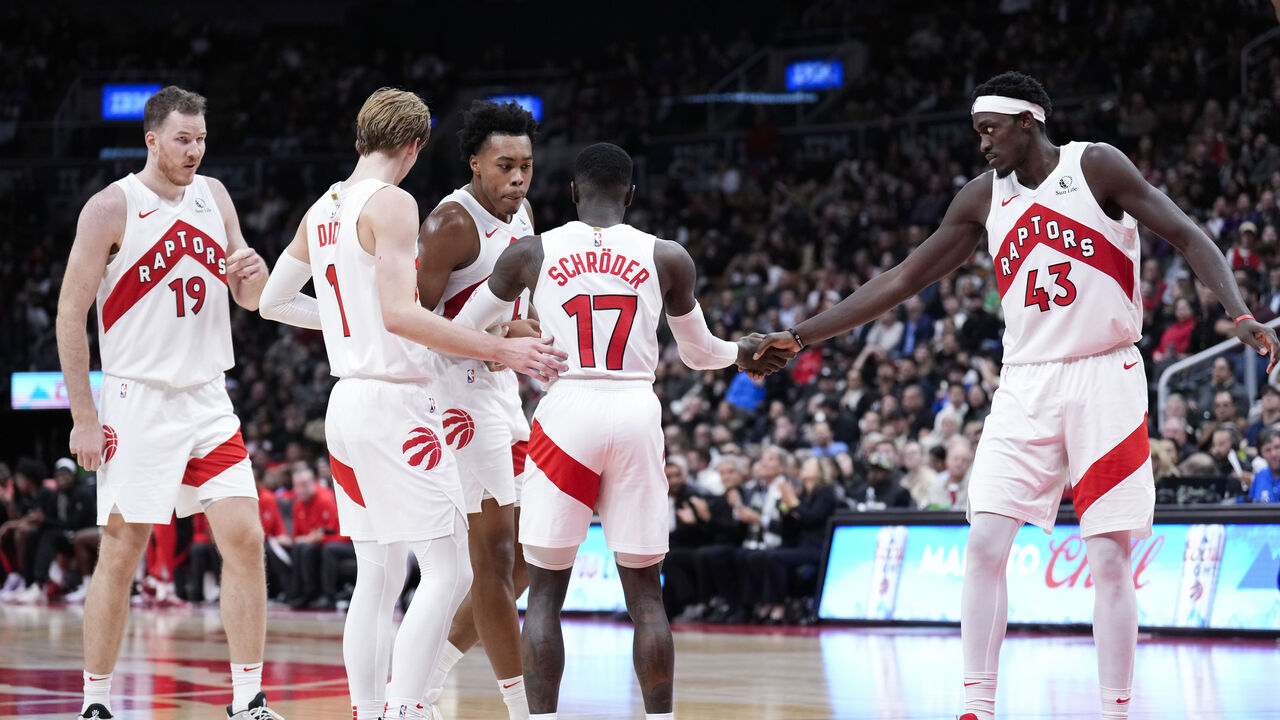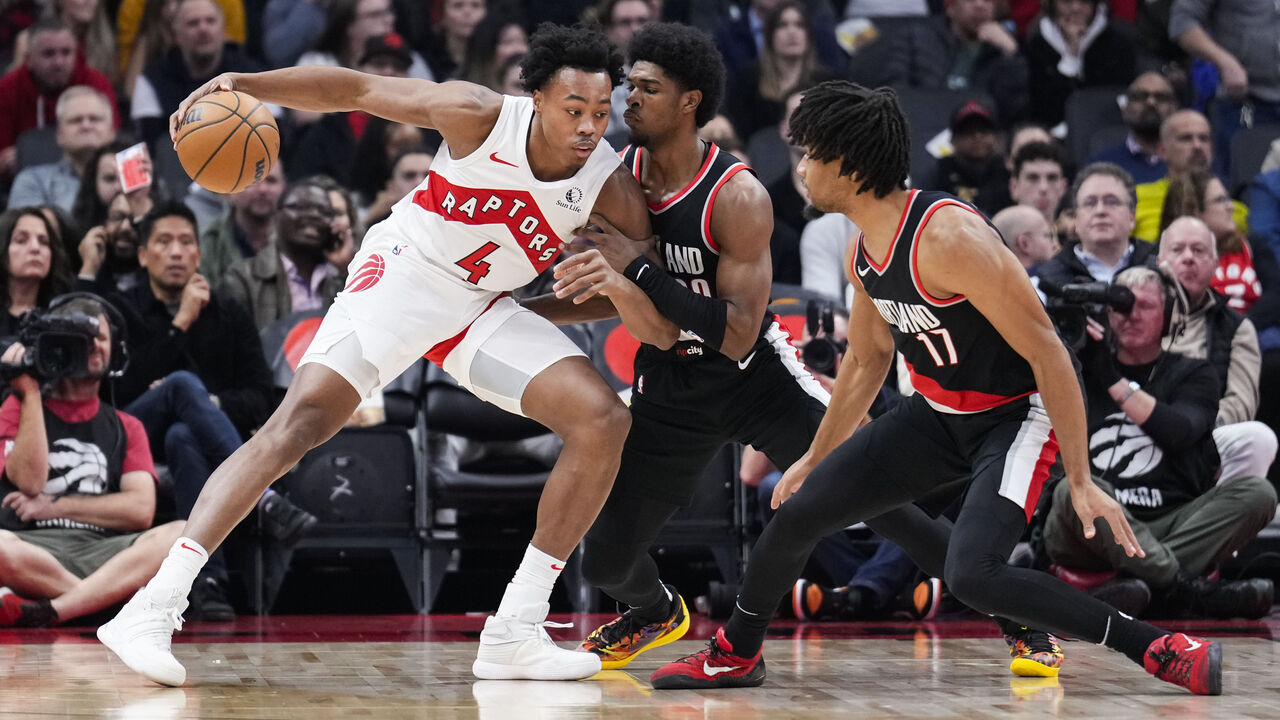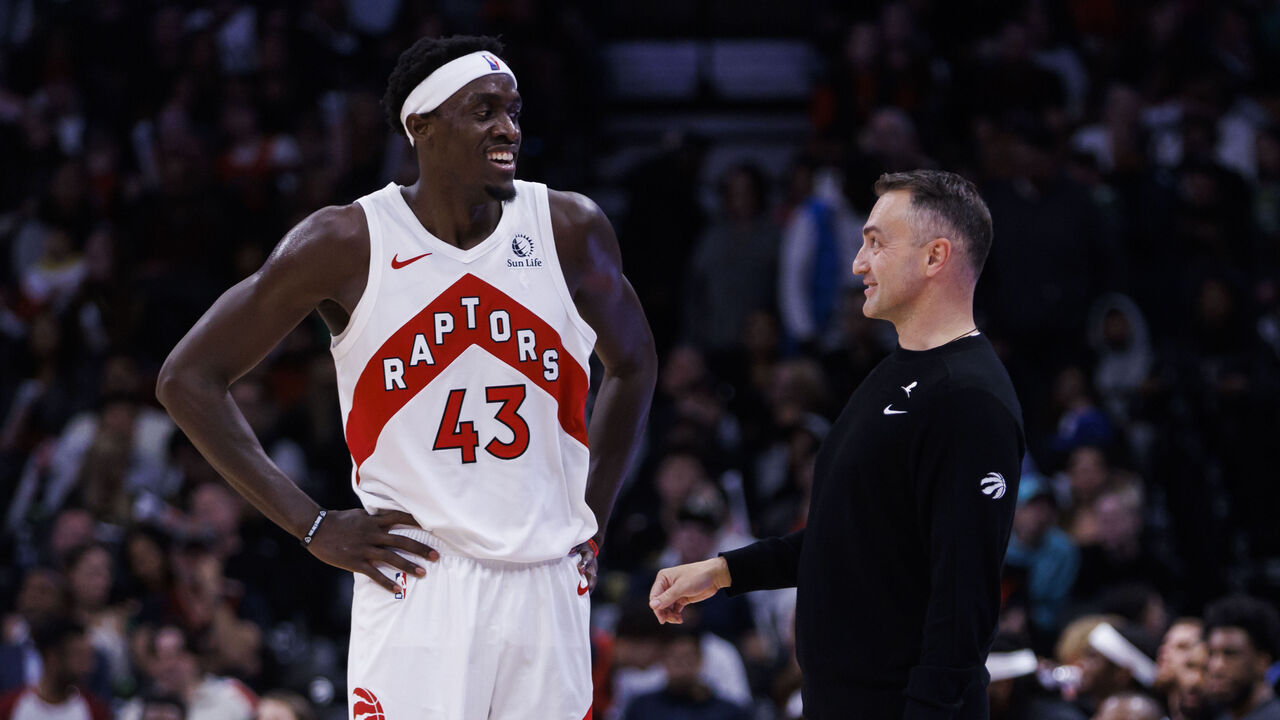The Raptors are testing the limits of an offensive philosophy shift
Nobody affiliated with the Toronto Raptors publicly said the words "culture reset" this offseason, like team president Masai Ujiri famously did after witnessing a deflating second-round sweep back in 2017. But that's very much been the messaging from everyone in the organization - front office, coaching staff, and players - about the intent of the 2023-24 campaign.
After a disappointing 41-41 season in which Ujiri bemoaned how unenjoyable Toronto was to watch, the summer brought the departure of two old-guard pillars in point guard Fred VanVleet and head coach Nick Nurse. Pascal Siakam remains a Raptor, but one with an expiring contract and an uncertain future after an offseason on the trade block. Dennis Schroder was signed to replace VanVleet. Darko Rajakovic was hired to fill Nurse's seat and implement a new offensive philosophy, along with a more player-friendly approach. Scottie Barnes has become the team's clear focal point and priority. Media day was spent offering platitudes about excising selfishness. All of which has led to a feeling that a page is being turned for this franchise.
It's not exactly a novel sensation; the Raptors have basically done nothing but adapt since the original culture reset was spoken into existence six years ago. That year brought a stylistic overhaul (engineered by the same guy - Nurse - who's been tacitly blamed for last season's process failures) and the best regular season in franchise history. When that season ended in another second-round sweep, Nurse replaced Dwane Casey as head coach and long-tenured players were shipped out for Kawhi Leonard, Danny Green, and later Marc Gasol. Those moves resulted in a championship, but Leonard and Green departed that offseason, Gasol and Serge Ibaka left a year later, and Kyle Lowry said goodbye the year after that.
The Raptors navigated most of those pivots gracefully (their one sub-.500 season got them Barnes), and they staved off a full-scale rebuild by remaining competitive enough to keep the front office focused on the near term. The team's decision-makers certainly have more of an eye to the future now, but they clearly harbor hopes of this year's squad staying competitive as well, given they shelled out their 2024 first-rounder to acquire (and re-sign) Jakob Poeltl, and that Siakam and fellow impending free agent O.G. Anunoby haven't been traded.
In that sense, Toronto is testing the limits of a philosophical shift. Because practically speaking, this is a very similar roster with similar (in some cases starker) limitations to the one that finished bottom six in true shooting and half-court efficiency each of the last two years. There's no doubt Rajakovic's pass-heavy offense looks different aesthetically than Nurse's did, but it's one thing to come in preaching change and another thing to implement that change in a way that breeds newfound success.
The Raptors are off to a 1-3 start, with the worst offensive rating in the league. While they've offered plenty to feel encouraged about - they continue to thrive in transition, their more conservative base defense has been tremendous, and Barnes appears to have taken a sizable leap on both ends - their half-court offense has been inept enough to undercut most of the positives.

As promised, players are moving more, passing more, and running more possessions through the high post and elbows via dribble-handoffs and split actions. The Raptors are averaging a league-leading 315.5 passes and assisting on 65.6% of their made field goals, up from 292 and 57.1% a season ago. They've gone from attempting the sixth-most pull-up jumpers per game to the fourth fewest. Isolations and post-ups as a share of their finished possessions have dipped, and they're averaging fewer dribbles per touch than all but two teams. No one could accuse them of playing selfishly.
And yet, for all that, they've scored a league-worst 77.1 points per 100 first-shot half-court possessions, failing to even match last season's 25th-ranked average (94.5) in any of their four games. (They also haven't demonstrated anything approaching last year's offensive rebounding prowess to give themselves additional bites at the apple.) They lost to the rebuilding Trail Blazers on Monday night, mustering a 97.8 offensive rating against a team that came in allowing 117.8.
Poeltl, who's been tasked with a lot of the aforementioned high-post initiation, was blunt when talking to reporters after Monday's loss. "We're trying to have this drive-kick-swing offense, play through the elbows, trying cuts, different split screens, stuff like that," he explained. "But at times we get in this mode where it seems like everyone's just trying to make something happen kind of randomly, and we're not on the same page. And then we just dribble into a crowd, try and kick out, next guy's dribbling into a crowd. We're not really getting any advantages out of it."
It's going to take time, Rajakovic says.
"I think that our guys have the willingness to do the right thing, but still they don't have enough confidence to do it consistently, to do it over and over," he told me. "We still don't have our identity created, or our foundation created."
How much of that is really about execution, though, and how much of it is about personnel? There are things the Raptors can do better, but at the end of the day bending a set defense is hard to do without high-end ball-handling and movement shooting, both of which are in short supply in guard-poor Toronto. Schroder brings more rim pressure than VanVleet, and his playmaking has been a pleasant surprise, but he's a similarly poor finisher with a lot less off-ball gravity.
The Raptors can cut, hand off, and reverse the ball to their hearts' content, but what does that amount to if their actions aren't treated as genuine threats by opposing defenses? If their screens are ducked under or comfortably switched, spot-up shooters are ignored, dribble penetration is contained, gaps are filled, and the paint is packed? Quick-hitting passing sequences can widen advantages, but they don't necessarily generate advantages on their own.
Even when the Raptors do everything right to create and extend those initial micro-advantages, they can find themselves running into walls. Take, for instance, this late-game possession from Monday's loss to Portland, when the Raptors had one of their best spacing lineups on the floor (with Barnes at the five) and ran a Siakam-Barnes pick-and-roll. It was one of the few times this season we saw them use their two best players in a direct action together, probably due to the pair's overlapping skill sets and the way their like-sizedness makes their actions easy to switch. The Blazers did indeed switch on this occasion, and what happened from there was illustrative.
When I asked Rajakovic before the season how he wanted the team to attack switches without resorting to the plodding iso-ball tendencies of yesteryear, he cited the importance of nailing their timing on slips. He's also constantly hammered the need to play with pace - not just in transition but in the half court - in order to put defenses on the back foot. This was a perfect example of what he was looking for. Barnes slipped the screen and darted into the lane, getting underneath Jerami Grant on the switch. Siakam immediately hit Barnes with a pass over the top. Barnes was met with an early tag from the strong-side corner (where Schroder was stationed), but quickly kicked the ball to that corner and triggered a swing-swing sequence that got Gradey Dick downhill attacking a hard closeout. The Raptors made four passes and touched the paint twice in the span of six seconds.
Alas, Blazers guard Shaedon Sharpe made another aggressive rotation off of Schroder in the corner and swatted away Dick's finger roll. Good process doesn't always produce good results, but it's tough when even the lineups designed to open up the floor can't fully achieve their desired effect, especially given how poor the Raptors' rim protection and defensive rebounding has been with Poeltl on the bench.

Of course, all of these limitations were well established coming into the season. But it's still been interesting watching the Raptors try to overcome them by strengthening a whole different set of muscles rather than relying on the ones they've already built up.
"I'm always trying to take emotion out of it when I watch film," Rajakovic says of the steep learning curve. "And that's what I'm telling our guys. I really believe in the work they're putting in, and I really believe that we're gonna make strides in that area."
There will be times, of course, when the dominant muscles take over. In a stupefying loss to the Bulls over the weekend, Toronto's best offensive stretches came when Siakam and Barnes hunted mismatches and played bully ball, a tried-and-true formula for this team full of jumbo wings. The issue is those plays can be static, slow to develop, and siloed, and Rajakovic is trying to build something more fluid and egalitarian. He doesn't want the team to get too comfortable falling back on old habits, even when the new ones he's trying to instill encounter roadblocks.
"It's hard. That's the art of this job," he says. "We want to create new habits, we want to play to a different identity, but then we have certain players that are really good at doing certain (other) things. So, yes, occasionally it makes sense to look for a mismatch and take advantage of it.
"Definitely all of us are extremely competitive, we want to win the game. But at the same time, we know that we cannot revert to that style of play as our baseline, because it's not going to give us any of our long-term goals. We want to develop our roster, and we want to develop our young pieces to play to a certain standard of the game."
You can feel the inherent tension in all of this, because while Rajakovic clearly isn't just speaking for himself when he takes the long view, the front office is still straddling the team-building fence. That indecision is clouding the role and expectations of Toronto's two-time All-NBAer and erstwhile franchise player, who's touching the ball for almost two fewer minutes a game than he did a year ago. Siakam hasn't uttered a word of public complaint, and has said all the right things about wanting to do what's best for the team. But this is all going to get increasingly hard to sell to a guy playing for a new contract if it isn't leading to wins.
"The NBA is a game of matchups," Siakam said Tuesday. "We've got to find a way to exploit what we have, the talent that we have, and get the best out of it. That's the way it's gotta be. And as a team - coach is involved - we've got to figure out a way to do that."

The good news is none of this is as bad as it looks right now. The Raptors aren't going to have a sub-80 half-court offensive rating all year. Their decision-making and synchronicity of movement will improve as they get more familiar with the new system, and they'll win a bunch of games solely on the strength of their defense and transition play, as they did on opening night. They're forcing way fewer turnovers than they did under Nurse, but scaling back their aggressiveness has led to a much healthier defensive shot diet. And they still rank seventh in the league in transition frequency and second in transition scoring efficiency, proving that forcing misses can be just as effective as generating takeaways at sparking the fast break.
Their structural issues aren't going anywhere, and won't be addressed externally (stripping more draft-pick equity from a middling team with long-term aspirations would be hard to justify, so Buddy Hield or Tyus Jones probably ain't walking through that door). But some internal shooting growth would go a very long way, and hey, player development is a big reason why they hired Rajakovic. He has plenty of experience working with players on their jump shots, including Mikal Bridges in Phoenix. There are shooting plans and programs in place for every Raptor, and if one or two of them pops, it will change the shape of the team's offense.
"I'm very optimistic on Scottie and his 3-point development," Rajakovic said of the ascendant third-year forward, who shot 7-for-14 from deep in the preseason. "I think Pascal needs to take more threes, and I believe he's a better 3-point shooter than he's shown. Dennis definitely has room for progress there. Gradey (Dick) is such a young player, he's learning the game speed and all of that. He needs to become a (more consistent) make-two-out-of-five-a-night player. But all of that comes with a lot of work, a lot of repetition, and a lot of patience.
"(My) first month working with (Bridges), I didn't (say) one word about his shot that was completely broken at the time. I was just collecting information and talking to him. And then in one practice we just addressed one small detail of him catching the ball closer to the body, and he said he was feeling so much better and more confident, and it changed his career. I believe that we have multiple players on the team (who) can have similar paths."
For what it's worth, Anunoby - probably the team's best standstill shooter - says he's worked on becoming a more versatile 3-point threat who can shoot off of movement and off the dribble. And while Rajakovic is nudging the team away from off-the-bounce jumpers, the type of one-dribble pull-ups Anunoby showed off in the season opener - whereby he was able to create a bit more space for himself when coming off pindowns or handoffs - will be hugely valuable if he can hit them consistently.
One way or another, a development of that nature is sorely needed for a franchise that's seen its Midas touch run dry in recent years. Barring that, or an organizational change in direction, it's hard to imagine the Raptors' grand culture reset this season being anything more than a different path to the same destination.